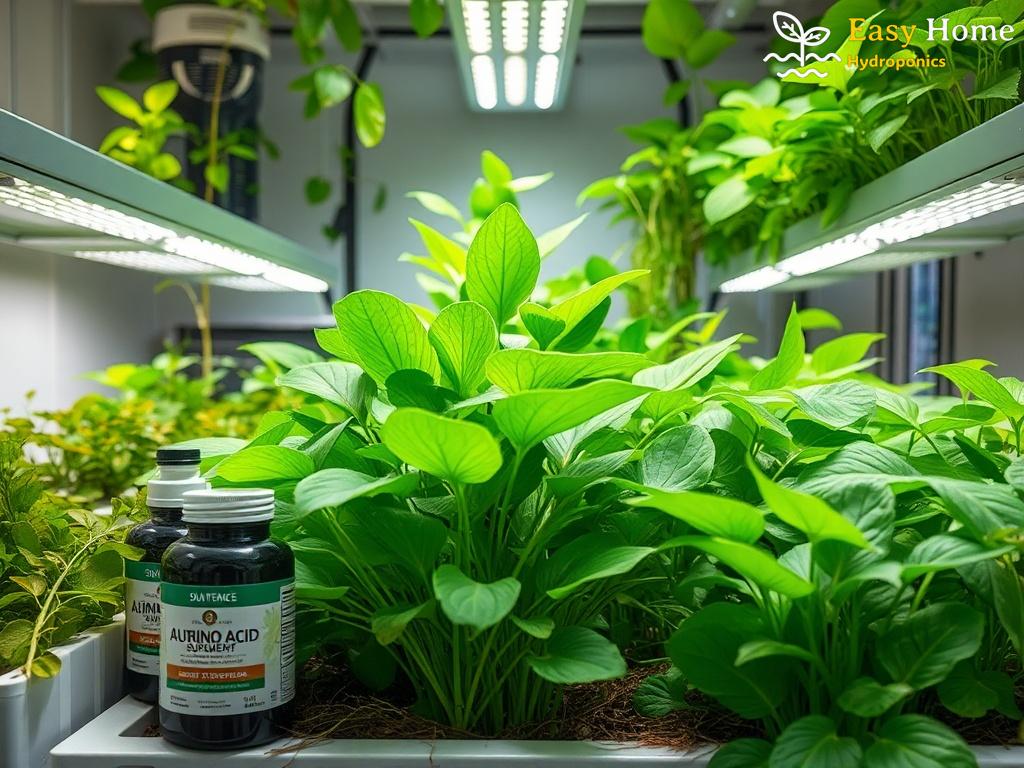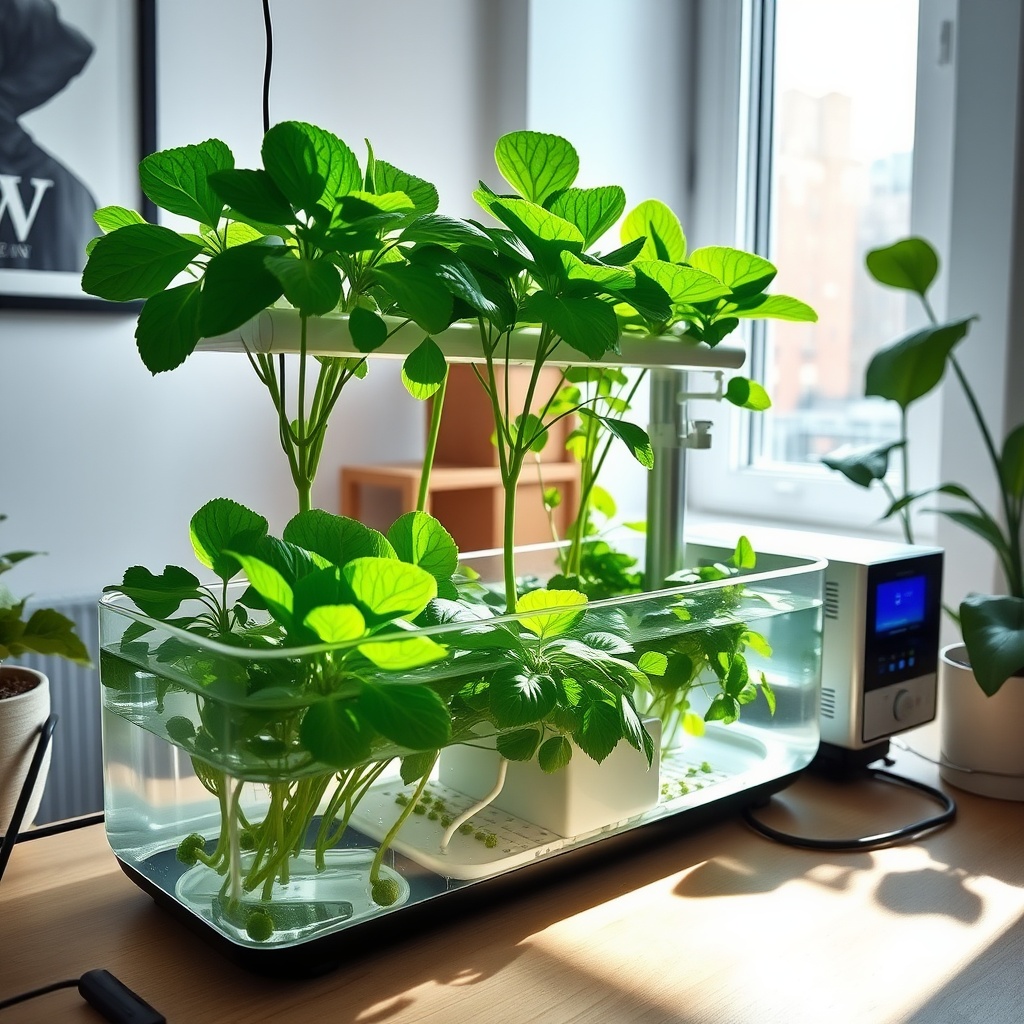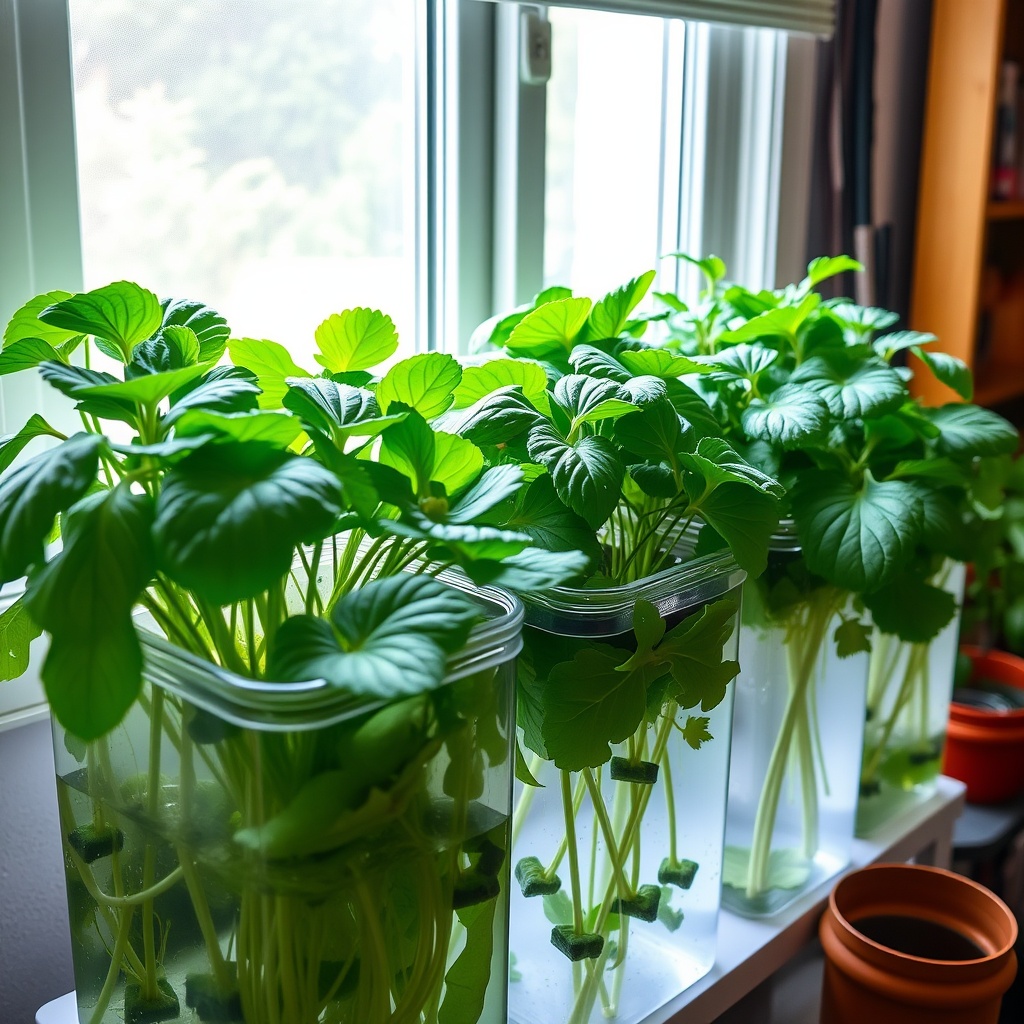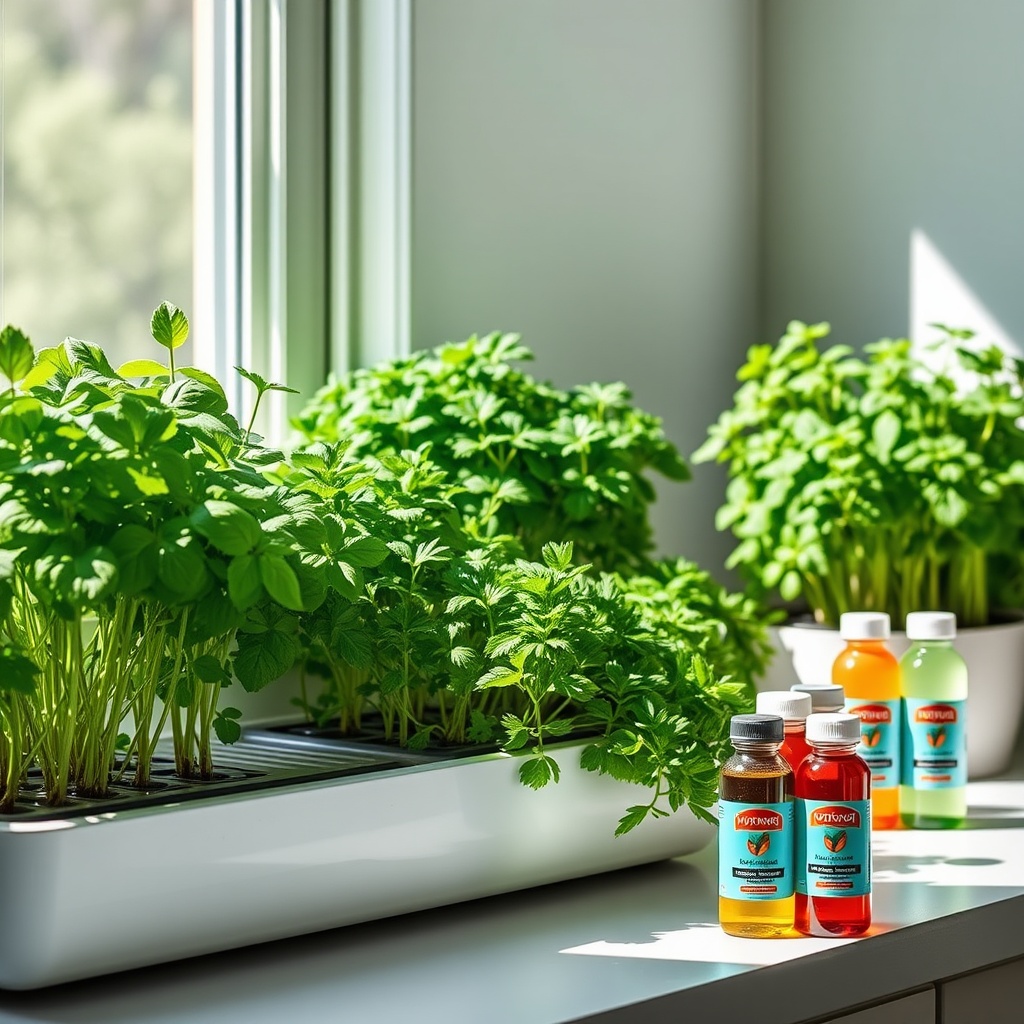Unlocking Plant Potential: The Role of Amino Acids
When we think of plant nutrition, we often picture macronutrients and micronutrients. However, there’s a hidden powerhouse that plays a crucial role in enhancing plant growth – amino acids. These organic compounds, often referred to as the building blocks of life, are indispensable for optimal plant health. By understanding how amino acids work, home hydroponic gardeners can unlock the full potential of their plants.
Amino acids are not just beneficial; they are essential for various physiological processes in plants. They contribute to protein synthesis, enzyme activity, and even stress resilience. In hydroponic systems, where plants rely entirely on nutrient solutions, amino acids can significantly boost growth rates and overall vitality. They facilitate better nutrient absorption, enhance photosynthesis, and improve the plant’s ability to cope with environmental stresses.
As the popularity of amino acid supplements grows, it’s important to choose the right source for your hydroponic setup. Below is a comparison of different amino acid sources to help you make an informed decision:
| Amino Acid Source | Benefits | Considerations |
|---|---|---|
| Plant-based Amino Acids | Rich in essential amino acids, eco-friendly | May require higher doses |
| Animal-derived Amino Acids | Fast-acting, high potency | Less sustainable, potential odor issues |
| Synthetic Amino Acids | Precise formulation, readily available | Less natural, potential chemical concerns |
Choosing the right type of amino acid supplement can significantly impact your hydroponic garden’s efficiency and sustainability.
Hydroponic Harmony: Combining Nutrients with Amino Acids
In the dynamic world of hydroponics, achieving a delicate balance of nutrients is crucial for plant success. While many hydroponic enthusiasts focus on the primary macronutrients like nitrogen, phosphorus, and potassium, the inclusion of amino acids can create a symphony of growth, enhancing the overall health and yield of plants. By seamlessly integrating these organic compounds into your nutrient regimen, you can elevate your hydroponic garden to new heights.
The Art of Nutrient Synergy
Amino acids work in concert with essential nutrients to optimize plant functions. They act as conduits, facilitating the uptake of nutrients and promoting efficient metabolic processes. When combined with a well-balanced nutrient solution, amino acids can lead to enhanced root development, increased chlorophyll production, and improved flowering and fruiting. This synergy not only boosts plant performance but also supports resilience against pests and diseases, creating a robust growing environment.
To fully appreciate the impact of amino acids in hydroponics, it’s vital to understand how they interact with other nutrients. When integrating amino acids into your feeding schedule, consider the following benefits:
- Enhanced Nutrient Absorption: Amino acids improve root efficiency, allowing for better uptake of essential nutrients.
- Improved Stress Response: They help plants cope with environmental stressors, such as drought or nutrient deficiencies.
- Stimulated Growth Rates: By supporting cellular functions, amino acids can accelerate growth rates significantly.
This intersection of amino acids and nutrients creates a holistic approach to plant care, ensuring that your hydroponic system performs at its peak.
When planning your hydroponic nutrient strategy, it’s essential to tailor your approach based on specific plant needs and growth stages. Different plants may require varying ratios of amino acids and nutrients, making it important to monitor plant responses closely. Regular adjustments based on growth observations can lead to optimal nutrition, maximizing both yield and quality.
Incorporating amino acid supplements into your hydroponic setup is not merely an enhancement; it’s a transformative strategy that harmonizes plant nutrition. By understanding the role of amino acids and their interaction with nutrients, you can create a thriving hydroponic ecosystem that yields bountiful results.
Boosting Growth Rates: Amino Acids as Catalysts
In the quest for lush and thriving hydroponic gardens, every grower seeks that magic ingredient that can push their plants to new heights. Enter amino acids, the unsung heroes of plant nutrition. These organic compounds are more than just building blocks; they act as powerful catalysts that can significantly enhance growth rates, ensuring that your plants not only survive but thrive in a hydroponic environment.
Amino acids serve multifaceted roles in plant physiology, acting as vital intermediates in various metabolic processes. When introduced into your hydroponic system, these compounds can stimulate growth by:
- Stimulating Enzyme Activity: Amino acids boost the production of enzymes essential for various biochemical reactions, which accelerates growth processes.
- Promoting Protein Synthesis: They are crucial for synthesizing proteins that build plant structure and function, which is fundamental for robust growth.
- Enhancing Hormonal Balance: Amino acids can influence plant hormones, resulting in improved cellular division and elongation.
This intricate interplay of amino acids and biochemical pathways creates a fertile ground for rapid growth, making them indispensable for any serious hydroponic gardener.
With a plethora of amino acid supplements available, selecting the right one can feel overwhelming. However, understanding the specific benefits of different sources can streamline your decision-making process. Here are some key considerations:
- Plant-Derived Amino Acids: Often touted for their eco-friendliness, these amino acids are rich in essential compounds but may require higher dosages to achieve desired effects.
- Animal-Based Amino Acids: Known for their rapid action and potency, these supplements can deliver immediate results but may not align with sustainable practices.
- Synthetic Amino Acids: Offering precision and convenience, synthetic options can ensure consistent delivery of nutrients, though they may lack the organic appeal.
By carefully evaluating these options and tailoring your choice to your hydroponic setup, you can harness the full potential of amino acids to catalyze growth.
Stress Defense: How Amino Acids Protect Hydroponic Plants
In the ever-evolving world of hydroponics, the ability to mitigate stressors is crucial for ensuring that plants not only survive but flourish. Hydroponic gardening presents its unique challenges, from fluctuating nutrient levels to environmental changes that can induce stress. Thankfully, amino acids emerge as formidable allies in this battle against stress, fortifying plants and equipping them with the tools they need to thrive.
Understanding the Protective Role of Amino Acids Amino acids play a pivotal role in plant defense mechanisms, acting as biochemical shields that help plants withstand various stressors. When plants are subjected to adverse conditions, such as drought, nutrient deficiencies, or extreme temperatures, amino acids activate essential pathways that bolster resilience. They enhance the production of protective proteins and enzymes that assist in repairing cellular damage, thus promoting recovery and maintaining growth even in challenging circumstances.
The Synergy of Amino Acids and Stress Responses The interaction between amino acids and stress responses is a complex but fascinating process. Amino acids like proline and glutamine are particularly noteworthy as they play a significant role in osmoregulation, helping plants manage water loss during drought conditions. This capability is crucial for hydroponic plants, which depend on a consistent supply of water and nutrients. Moreover, the presence of amino acids can stimulate the synthesis of phytohormones, which are vital for regulating plant growth and development under stress. By integrating amino acids into your hydroponic nutrient regimen, you can significantly enhance your plants’ ability to adapt and thrive, even when faced with environmental challenges.
Boosting Overall Plant Health and Resilience Beyond immediate stress responses, the long-term benefits of amino acids in hydroponics are profound. By fortifying plants against stress, amino acids contribute to improved overall health, leading to higher yields and better quality produce. The enhanced nutrient absorption facilitated by amino acids ensures that plants are well-nourished and capable of performing optimally. This holistic approach to plant care not only enhances growth rates but also cultivates a robust growing environment that is less susceptible to pests and diseases. When hydroponic gardeners prioritize amino acids in their nutrient strategy, they are investing in a sustainable future for their plants, fostering resilience that will pay dividends throughout the growing season.
Amino Acids vs. Traditional Nutrients: A Comparative Analysis
As hydroponic gardening gains momentum among home growers, the quest for optimal plant nutrition has become a focal point of interest. Traditionally, the emphasis has been on macronutrients and micronutrients, which are essential for plant health. However, with the introduction of amino acid supplements, a new chapter in hydroponic growth has emerged. Understanding how amino acids stack up against conventional nutrients is crucial for anyone looking to elevate their gardening game.
While traditional nutrients are the foundation for plant growth, amino acids offer unique advantages that can amplify the effects of these nutrients. Amino acids are not just supplementary; they function as catalysts that enhance nutrient uptake and metabolic processes. Unlike traditional nutrients, which often require specific ratios and careful balancing, amino acids can fill the gaps left by nutrient deficiencies, acting as a bridge to ensure plants receive what they need when they need it. This dynamic capability allows for a more resilient growing environment, especially in hydroponic systems where conditions can fluctuate.
The interplay between amino acids and traditional nutrients creates a synergistic effect that is hard to overlook. For instance, while macronutrients such as nitrogen, phosphorus, and potassium are crucial for basic growth, amino acids like arginine and glutamic acid enhance the efficacy of these nutrients by improving root function and boosting chlorophyll production. This interaction not only promotes better absorption but also fortifies plants against stressors, such as pests or suboptimal growing conditions. In essence, amino acids can elevate the performance of traditional nutrients, making them an indispensable part of any hydroponic strategy.




